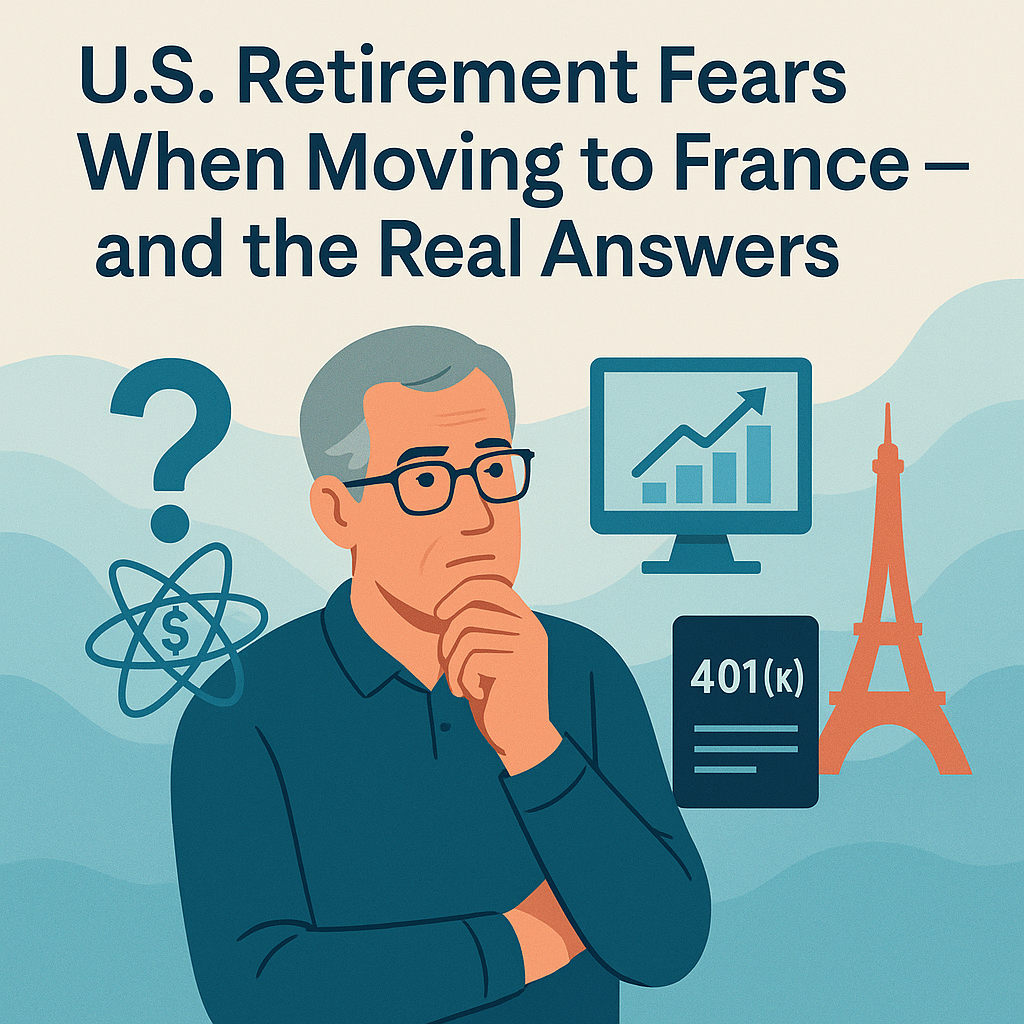U.S. Retirement Fears When Moving to France — and the Real Answers

If you're a high-earning American in your 30s or 40s — especially in tech or management — and you're considering a move to Paris, one big question might be holding you back:
What happens to my U.S. retirement plan if I move abroad?
The problem is fear of losing access or control, which causes stress and indecision. You want to keep growing your wealth securely so you can retire in comfort — whether you stay abroad long term or return home.
Here’s a clear breakdown of the six biggest fears and what you really need to know.
1. Fear: “Will I lose access to my U.S. 401(k), Roth IRA, or other retirement accounts if I move?”
✅ Reassurance: You don’t lose access to your U.S. retirement accounts just because you move overseas.
- Your 401(k) and Roth IRA stay active.
- You can still grow your investments.
- You generally can’t contribute to IRAs unless you have U.S.-sourced income.
Most expats keep their accounts open and manage them via U.S. brokers like Fidelity, Schwab, or Vanguard (Schwab is known to be friendly to U.S. citizens abroad).
2. Fear: “What happens to Social Security — will I still be eligible?”
✅ Reassurance: You’ll likely still qualify — and can collect it abroad.
- The U.S. and France have a totalization agreement.
- This treaty lets you combine work credits from both countries.
- If you work fewer than 10 years in the U.S., French years can help fill the gap.
You can receive payments by direct deposit while living in France. More than 700,000 Americans already do.
3. Fear: “What if I’m taxed twice — once in France and once in the U.S.?”
✅ Reassurance: You can legally avoid double taxation.
- The U.S.–France tax treaty protects you.
- You’ll likely use the Foreign Earned Income Exclusion (FEIE) and/or foreign tax credits to offset U.S. liability.
- Contributions to French pensions are tax-deductible in France and usually not taxed again in the U.S.
A cross-border tax advisor can ensure you make the most of these tools (we can recommend specialists).
4. Fear: “Should I cash out my 401(k) before moving?”
✅ Reassurance: No — this is almost always a bad idea.
- Cashing out triggers income tax + early withdrawal penalties.
- You lose compound growth potential.
Instead:
- Leave it in place, or
- Roll it into a U.S.-based IRA with a brokerage that accepts expats (Schwab is a popular choice).
Some expats build parallel savings — continuing U.S. investment while contributing to French pension programs.
5. Fear: “How do French pensions work — and will I benefit?”
✅ Reassurance: If you work in France, you’ll contribute to the mandatory public pension system, and yes — you’ll benefit.
- French pensions are defined benefit plans (not stock-market-based).
- Even 5 years of contributions can earn retirement rights.
- You can claim your French pension while living abroad.
If you stay longer, you'll build dual entitlements — one in France, one in the U.S.
6. Fear: “Can I retire in France if I’ve paid into both systems?”
✅ Reassurance: Yes — and many Americans already do.
- You can live in France while drawing U.S. Social Security + 401(k)/IRA + French pension.
- France has bilateral rules that protect your benefits.
- France also offers affordable and high-quality healthcare for retirees.
This can lead to a safer, more cost-effective retirement than staying in the U.S.
Bonus Tip:
🛠️ Consider working with a cross-border financial planner — someone who understands both U.S. and EU systems. A few sessions can help you save thousands in penalties, taxes, and missed opportunities.
Final Thought:
Moving to France doesn’t mean giving up your retirement plan — it means adding new layers of long-term security. With the right advice, you can combine:
- U.S. retirement savings
- U.S. Social Security
- French public pension entitlements
Email us at franceexpatservices@gmail.com for help with cross-border financial planning, relocation, or retirement visa support.
Next up: "Can I Still Invest in the U.S. While Living in France? What Every Expat Needs to Know."




